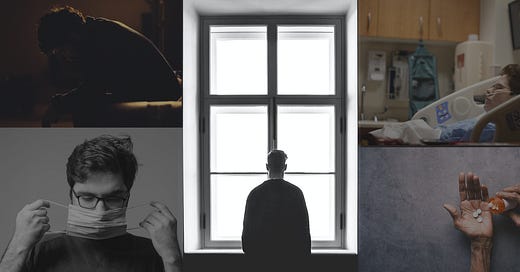In a strange way, it seems that people are trying to relive 2020, only two years later. Long-awaited reunions are being planned, cancelled programs are back on schedule and dates are being set for postponed weddings. Everyone seems keen to put the pandemic behind and move on.
Trust me, I understand the urge. This virus has been around for far too long and I’d love to go back to hanging around my loved ones without sparing a single thought to respiratory particles leaving my mouth, or holding my breath around someone who merely just cleared their throat.
But Covid is not done with us, as rising cases across Europe and parts of Asia suggest. Hospitals that had just undergone the Omicron wave are bracing for yet another wave of its latest mutation, Omicron BA.2. The post-pandemic world is still beyond reach and, even if it ever comes, it may not be the bliss we wish it would be.
This week in The Global Tiller, we look into Long Covid — a set of symptoms and long-term conditions that may develop in 10% to 30% of people infected with the coronavirus. What are some unexpected ways in which Long Covid is impacting our quality of life and how should we prepare to deal with its impact lingering long into our future?
What initially started off as anecdotal evidence about the long-term effects of Covid-19 is now increasingly being validated by scientific studies, which show that people developed myriad symptoms infecting parts of the body beyond the lungs. Long Covid can cause brain inflammation and low oxygen levels leading to cognitive problems. It can also cause vascular damage and blood clots that can lead to chronic fatigue. Autoantibodies and viral remnants can also trigger a set of reactions long after the initial infection.
Another study shows that Covid may cause shrinkage and tissue damage in the brain, primarily in areas related to the sense of smell but that are also involved in other brain functions. Yet another study, by Lancet, found that people who have recovered from a Covid infection are 40% more likely to get Type 2 diabetes. In fact, UK’s National Health Service lists a total of 14 symptoms of Long Covid.
All in all, Long Covid can be debilitating and, the next time you hear someone say that they might as well catch the virus and get it over with, kindly inform them about Long Covid (or just forward them this newsletter).
Public health authorities are stuck between a rock and hard place. On the one hand, there is pressure from the population, mostly from corporations, to lift restrictions and reopen economies. While on the other hand, the virus continues to mutate and cases continue to rise. The compromise they’ve made is to ease all restrictions as long as hospitalisations and mortality stay low, which is a pretty low bar to be honest.
Granted, it is better to have less severe infections than fatal ones. But what happens if a large chunk of the population develops Long Covid? The UK government has estimated that approximately 2.4% of its population has been experiencing symptoms of Long Covid. In absolute numbers, this comes to around 1.5 million people. If we assume similar prevalence in other countries, it means that a large proportion of the global population will continue to suffer from this disease long after our collective memory of it fades.
Some governments have shown awareness of the enormity of this crisis and have announced additional funding to deal with Long Covid, especially aimed at research and treatment. But, as the Institute for Global Change argues, a lot more still needs to be done, such as maintaining databases of Long Covid patients to monitor their progress, establishing clearer guidelines for its diagnosis, creating a dedicated task force and even setting up specialised ministries.
Until that happens, let’s show a little more kindness to those around us who may be suffering from Long Covid without even knowing about it.
Take care and stay safe.
Hira - Editor - The Global Tiller
Dig deeper
A man shares the haunting ordeal of losing his wife to Long Covid. [Trigger Warning: This article mentions suicide and may be distressing to some of our readers]
Alexander Rheeney on journalism, ethics and information
Don’t miss our latest Pacific Toks podcast episode in which we look closely at journalism in our region: what are the challenges, the specificities and the hopes going forward for a well-informed Pacific. We are lucky to have with us Alexander Rheeney, a journalist from Papua New Guinea now working as an editor for the Samoan Observer in Apia, Samoa. Alexander has been closely involved in this field through his work at the Pacific Freedom Forum, the Media Council of PNG and the Lowy Institute.
…and now what?
“It’s just a flu.”
“It’s not too bad.”
“It’ll disappear by itself.”
“It’s just politicians playing the blaming game, it will pass…”
Very often we hear these sentences from people, businesses, industries and companies. We hear these attempts to diminish the potential consequences of a disease, a chemical leak, or even a racist comment.
It’s hard for everyone of us, individuals or collectives, to think hard about how our actions and decisions will impact in the long run. Even if we try hard, we tend to get stuck in the moment. Or we only see things from our own perspective. An imaginary perspective, as I learned recently in a podcast by the Future of Life Institute, the ability to create a perspective based only upon our sole perspective, without really trying to go beyond what we can actually see.
As history has shown us many times, unintended consequences are something we can all anticipate. Yet, we don’t see them. Is it out of a lack of perspective, a lack of caution, or simply something we’re not wired to do? Is it a survival instinct from the past ages where what mattered most was the immediacy of our decisions, not whatever could happen next?
But it has been a while that we have been living in a world where the consequences of our decisions have time to last. They can spread and impact many people beyond our foresight.
The complexity of our times and the deep interconnectedness of our communities, in fact, make unintended consequences a matter of survival.

Time will eventually tell but the story of Long Covid is a tale of unintended consequences. One that started with not-so-prepared governments, opportunistic politics and unwilling citizens way too comfortable in their risk-free societies.
Our systems, put in place for decades now, made us think that everything was under control. But in this risk-free and highly controlled society, we eventually lost our ability to think about the far away consequences of our decisions. We thought that if we throw plastic on the street, someone will pick it up. Not a big deal until we discovered plastic continents across our ocean. We thought we didn’t have to open our borders and our communities because someone will take care of the refugees, until we found them on our beaches, drowned by carelessness.
We forgot we are all connected. We forgot that this is eventually a small planet and consequences travel at the speed of light. So when Covid-19 hit, we decided we didn’t have to be cautious enough to know more about this new threat. Not even aware of the origins of it, we decided it was not a big deal. We decided our comfort was more important that the health of many. We figured it will go away eventually, much like the finale of a terrible show that made the buzz for a while.
But complex systems, much like everything around us, don’t work that way. They have a strong memory of our actions and decisions because the consequences of our actions resonate throughout.
The unintended consequences of Covid may be just Long Covid. Or it may be more than that. It could also be the divisions within our communities caused by the pandemic of misinformation. It could be a complete mistrust in our institutions, in our forms of government, in reality itself. Whatever those consequences will be, we’ll have to cope with them. That’s what we do as humans.
But it makes you wonder, if we really did have the ability to envision our unintended consequences, how many opportunities could we have created, how many lives could have been saved? Maybe unintended consequences are here to force us to think harder, to be more creative and to stop being resilient, to stop passing down the consequences of our actions onto others.
As climate change tells us, there’s a heavy price to pay for our lack of caution.
Philippe - Founder & CEO - Pacific Ventury





